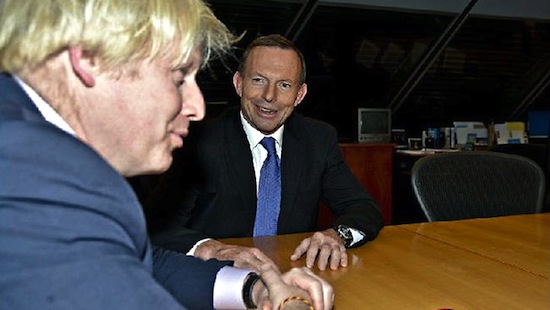With Abbott and Hodgman out of contention, who is going to stand up for effective climate policy? [29 January 2012 | Peter Boyer]

Boris gets a laugh out of Tony. SOURCE: AAP: John Ferguson/News Ltd
During a brief UK visit just before Christmas, Opposition Leader Tony Abbott was asked about a ticklish issue back in Australia. He said he hadn’t been able to consider it because he was busy “doing very important things”.
Not being privy to his London meetings I can’t judge their importance, but there were certainly a lot of them, including an intriguing one with the Lord Mayor of London, the unique Boris Johnson.
Johnson’s witty retorts and affable, waggish manner have won him quite a following across Britain. He’s now seen as a successor, even a challenger, to David Cameron as leader of the Conservative Party. A bit like Campbell Newman’s rise from Brisbane mayor to Queensland premier.
In his column for the UK Telegraph (it earns him £250,000 a year, thanks very much), he’s been touting the forecasting talents of a “learned astrophysicist” named Piers Corbyn. With London under heavy snow last week he went a step further, citing Corbyn’s claim that global warming isn’t happening.
“It still seems a bit nuts to talk of the encroachment of a mini ice age,” wrote Johnson. “But it doesn’t seem as nuts as it did five years ago. I look at the snowy waste outside, and I have an open mind.”
Johnson’s Little Britain is a long way from Australia. I see no snow in my view outside, only shrivelled grass and damaged shrubs in the wake of record-breaking heat. But surely, only a mug would make judgments about climate by looking out the window.
The best basis for assessing climate theory is the body of published, peer-reviewed papers in independent scientific journals, and a good measure of a paper’s credibility in the scientific community is the number of citations it has received in other published research in the field.
This was the approach of a veteran American climate scientist, James L. Powell, appointee of Presidents Reagan and Bush (senior) to the US National Science Board, when he tackled the level of acceptance of the scientific theory of human-caused global warming.
In November Powell posted results of a search using the online science publication tool “Web of Science” for peer-reviewed scientific articles about global warming and climate change published from 1991 to late 2012. The search produced 13,950 papers, among which Powell found a mere 24 that rejected global warming or endorsed non-human causes for it.
As Powell says, if any one of this tiny minority of papers had managed to falsify human-caused global warming it would have earned more citations than any scientific publication in history. Yet the 24 “contrarian” papers were on average cited only five times compared to about 19 for articles supporting global warming.
Powell found one research paper in every 581 — 0.17 per cent — that rejected the theory of man-made climate change, involving 34 authors out of 33,690, or one scientist in 1000. This is no “scientific controversy”. The verdict is in, and contrary views are unsupported. End of story.
So these would-be national leaders — Abbott, who once declared climate science to be “crap”, and Johnson, after looking out on London snow — have cherry-picked one scientist in 1000 to bolster their claims that it might all be a lie.
This pall of ignorance extends to Tasmanian conservatives. A couple of days before Christmas Will Hodgman said he backed Abbott’s policy to axe Australia’s carbon pricing scheme.
The Gillard government’s pricing scheme is a very imperfect beast. Allowing polluters unlimited scope in paying for avoided emissions overseas seriously compromises its ability to cut emissions at home. But as a statement of long-term Australian commitment it shouldn’t be undervalued.
It’s this that Abbott seeks to repudiate, which is why his stance on climate change action and that of those he influences, including Will Hodgman, is so pernicious.
Like Johnson, they are taking this line because they think there are votes in it. With national elections due late this year and Tasmanian elections in March 2014, their opponents could prove this wrong if they picked up on President Barak Obama’s bold declaration that climate change is a global crisis.
But there’s precious little sign of that happening. Julia Gillard and Tasmanian premier Lara Giddings are yet to take up the chance to nail their opposite numbers for their reckless rejection of scientific wisdom.
Tasmania’s climate change minister, Cassy O’Connor, is one of the few politicians who do seem to get it. She told an international climate science summit in Hobart on 16 January that development of public climate policy was “lurching along the path to an epic fail”.
“As leaders within our respective communities, we must intensify efforts to educate the public policy makers (like those bureaucrats and politicians in Tasmania who resist the setting of an interim 2020 emissions reduction target for fear it would send the wrong message to business),” O’Connor said.
“I’m still working on them, but it is one of the challenges of a power-sharing government.”
Both O’Connor in Hobart and Senator Christine Milne in Canberra have struggled to raise public awareness of the need for strong climate action. I don’t want to put a dampener on their efforts, but as Greens their views get scant respect in the meeting rooms of the major parties.
Abbott and Hodgman have shut their ears to the call for climate leadership, and there’s no sign of revolt within their parties. Which leaves Gillard and Giddings. If they can hear the call and strike effective blows for enlightened, science-based policy they may yet come out on top.
